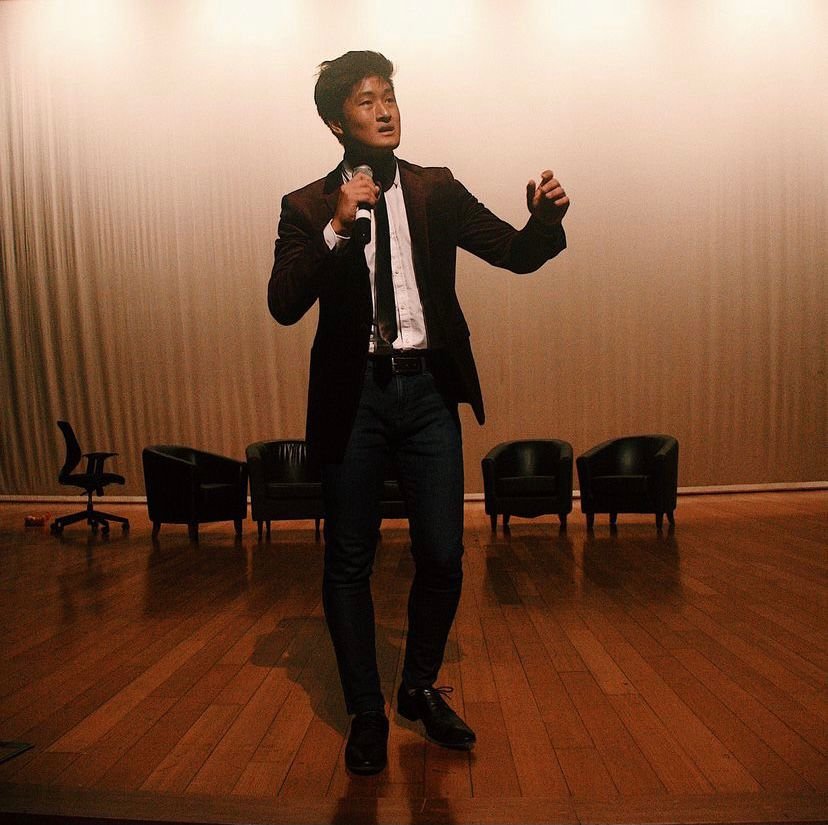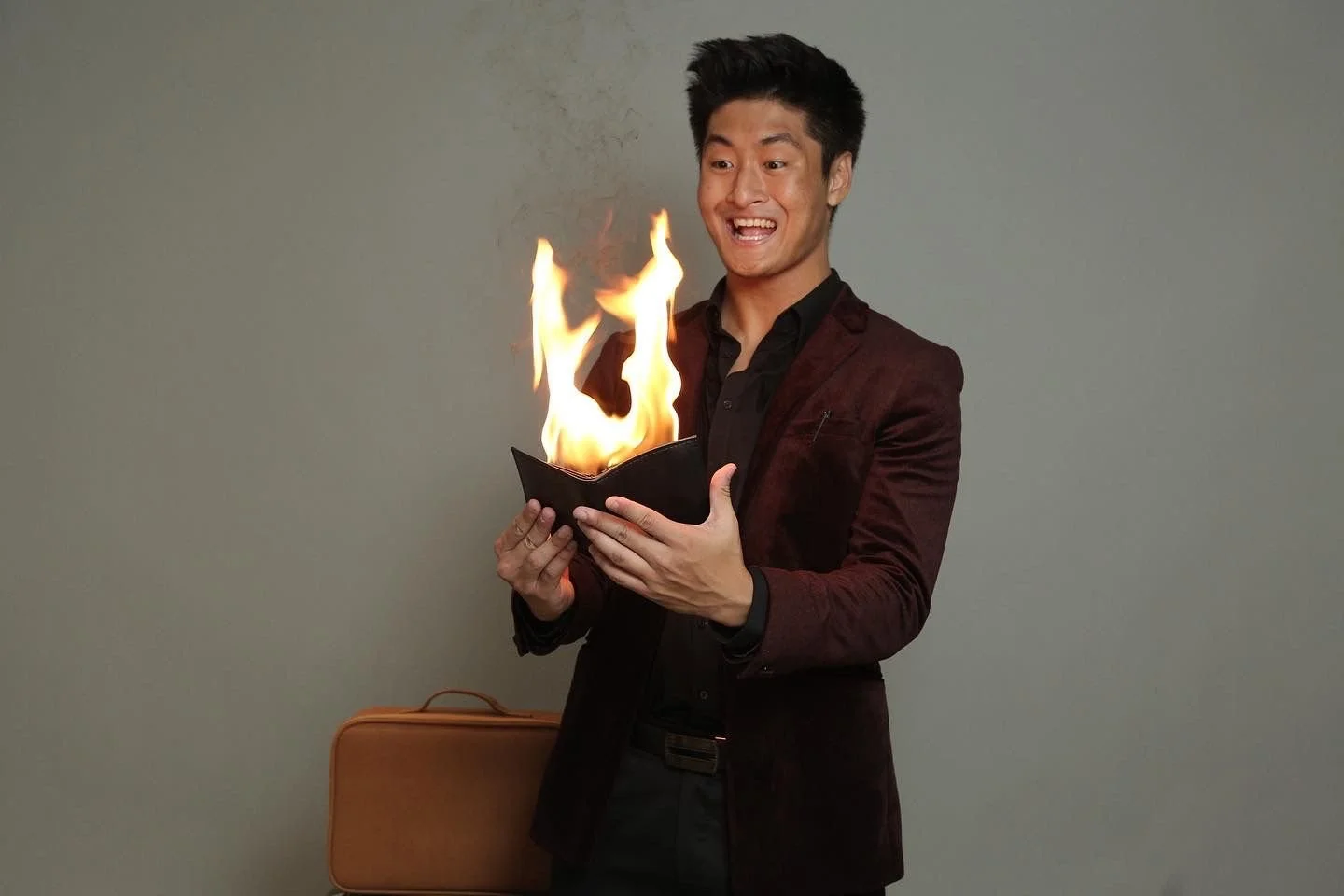Kai Emmanuel Kuah
My name is Kai and I have dyslexia and ADD.
Kai, a university student and professional magician, didn’t wish away his learning differences with magic. Instead, he overcame them through sheer hard work and with the firm support of his family.
I'm 22 years old, and currently studying at NTU in the Wee Kim Wee School of Communications and Information. I'm a Year 2 student right now, specialising in advertising whilst pursuing a minor in drama and performance.
Dreams and passion
I enjoy meeting people. What I love about my course right now is that there are a lot of very interesting people that I meet all the time—people with unique talents and who really dare to pursue their talents. We have such a diverse range of people in the course and it’s very nice because we get to work on creative projects together, like making documentaries, films and advertising campaigns.
Besides school, I'm also working freelance as a professional magician. I'm part of this company where we do gigs, corporate events, virtual events, stage shows and workshops. It's something I'm doing as a passion. I’ve been doing magic since I was very young because my mom taught me when I was just in kindergarten. She would perform for my kindergarten schoolmates, and I was like her little assistant. That's how I got to watch my first magic show and see all the props, and eventually learnt them from her. Magic was really something that was passed down to me, my mum learned it from my uncle, who learned magic from my grandfather. My grandfather used to be part of a Singapore magic society in the past.
It has always been my childhood dream to do magic. It was something that started when I was really young, and at that time I was doing kids’ magic, which is fancy and flamboyant with silks and all that old-fashioned stuff. But after a while, I got bored because it’s just very showy and you can't really relate to the magic.
Eventually, I watched this movie called Now You See Me and it was a show about modern magicians. It was like a whole new side of magic which I have never seen before with great storytelling. That's when I really delved a lot deeper into magic and bought my first deck of cards. Since then I always carry a deck of cards with me everywhere. When I was in school and the teacher was teaching, I'll be practicing the cards underneath the table. I still do it sometimes now!
School days
SJI (St Joseph’s Institution) and CJC (Catholic Junior College) were like the best years of my life, because of the strong community there and the sense of pride in the schools. The teachers also gave us the space to be ourselves and do our own thing. In JC (Junior College), I also really enjoyed learning because I got the chance to do Linguistics and Literature. I really enjoyed these subjects, so studying was less of a pain in JC.
“But, growing up with learning disabilities (Dyslexia and ADD), there were definitely a lot of challenges coping with school. I remember struggling with dyslexia since kindergarten. I was a lot slower than my peers even at that age and could not write properly.”
I remember I always liked to press the lift button for my parents. Once walked into this lift and my parents asked me to press the number 3. I couldn't find it. I said, “I don't see any number 3. Why is there the letter E?” I was very confused.
My handwriting at that point was also very bad. I remember at one point, I just wanted to give up. So I told my mum, “Mummy, I’m just a boy that cannot read.” After that in primary school, I struggled with Mandarin a lot until I finally got exempted in Primary 3. That was a huge relief for me.
I recall this one incident in Primary 4 when we were doing a test in class. The teacher was nice enough to give me a bit more time to finish it. After she had collected the papers from other students, everyone in the class was waiting to go for their recess break. So they were all saying, “Kai, why you so slow? Hurry up leh! We all want to eat already. Stop being a burden!” So I just gave up and passed the paper back to the teacher.
Some people will always be jealous that I am exempted from Mother Tongue. They get very salty and envious, and would tell me, “Why are you so lucky? You sure you got dyslexia or not?” Probably because they don't understand what it is.
“My physics teacher once also told me that he knew his son has dyslexia but he didn’t want to tell his son or get him treatment because he didn’t want his son to think that he had an excuse not to do well. Instead, he would cane his son. I thought to myself—How does that make sense?”
Diagnosis
I was doing very badly in secondary school and couldn't focus in class most of the time. My parents got me a lot of tuition because I find it very hard to pay attention in a class setting. So I went to see the Child Guidance Clinic where they diagnosed me with ADD and recommended me to take this drug called Ritalin, which helps me to concentrate. However, there were quite a bit of side effects that came with the drug, which I did not like.
Finding my way
After my O-Levels, I decided that I didn't want to use Ritalin anymore. But I was also very lucky because I managed to do the subjects that I liked in Junior College, so it became a lot easier to pay attention. I also had extra time. Even though I really liked Literature, I was not doing well in it until towards the end of JC2. I almost failed Linguistics in JC1. I think at the end of the day, it is your drive to do well and to study hard.
I remember after my Rugby CCA competitions, there was this 7 or 8-month stretch before A-Levels. I made sure I studied every day and dragged my friends out to go and study with me. I realised that I can't study at home, because I get very easily distracted. I need to be outside like in the library in school or NLB.
I figured out what worked for me and put in the extra effort to make sure I spend time outside to revise my work before going home. From struggling so much with the English language initially and then coming to love it and now being able to use it in an effective way to express myself and communicate with others. That is something I can say I am proud of.
Support
I’m lucky because my mum is actually an educational psychologist, so she explained to me what dyslexia was when I was young. She helped me a lot with coping with my learning disabilities. She gave me role models like Albert Einstein, Tom Cruise and other people I know who are quite famous and yet have special needs. I think that helped a lot in being able to see that difference as not a bad thing, which I think is very important.
I think this concept of learning disabilities can be very hard to grasp, especially for parents who have never heard of it before. Or a family who really wants their children to do their mother tongue in school may not realise how challenging it is for someone who's dyslexic to be able to write in Mandarin because it is an entirely different language with different structures. I’m very lucky that I had my mom who is like an expert who knows how to help me, and also how to get me the help that I need.
Misconceptions
When I tell people about my learning differences, I get a varied response. Some people will just be like, “Oh that’s interesting”, and ask me a few questions about it. I think they're a bit more aware, so to them, it's not a super big surprise. Then some people have a bigger response, but they don't mean it in a bad way most of the time. I’ll just explain to them what it’s about, and I think it's good that they are interested to know more. So generally, it's a positive kind of reaction.
The only time I had maybe a negative reaction was with this psychiatrist I went to see. I showed him my prelim and O-Level results, and he took one look at them and said, “You did very well, so you can't have learning disabilities.” He just skipped past all the reports and made that conclusion based on pre-conceived biases or stereotypes, that students with learning disabilities can't do well.
I think a common misconception is that if you have a learning disability, you will be less successful, or that you will be bad at your academics in general. And maybe you'd be better at doing more practical or hands-on work.
I think a lot of people think it is something that restricts you for life, and they don't really see that with early intervention, you can adapt and grow, and learn to live with it. Then it doesn't really affect you that much when you grow older.
At present
To me, my learning disabilities are not so apparent now. I'm definitely still a bit slower than some of my peers in certain areas, like if you asked me to take a quiz I might take a bit longer. But it helps that in university, they’re not testing you for speed anymore, like how fast can you write this essay or answer this MCQ. They just want to know whether you understand what you're reading. So my slower pace is not that big a problem anymore.
Advice
“Don’t let those labels define who you are. At the end of the day, what makes you different also makes you special. Being able to think differently or having a unique perspective can be a gift or a blessing in disguise as well.”
Hopes for inclusion
I hope we can do more to educate teachers on what special needs are, and to encourage people with these signs or symptoms to get diagnosed. As a teacher, you can see who is the student that really struggles, so I think the more teachers know how to spot these signs, the more they will be able to help these students. Teachers can also educate other students in the classroom so that everyone knows what special needs are.
“I also hope there will be a more inclusive society in Singapore. The government has a very important role to play in creating inclusive environments in schools and in ensuring fairness for students and upholding meritocracy.”
That will also drive social change, with people having more open mindsets. Also, to encourage parents to seek help for their kids and really take the time and effort to understand what the learning differences are. Sometimes, like for kids who have ADHD, it can be very hard for parents to understand what's going on and sometimes the signs may not be clear. They need to speak to a professional to have a better understanding of the conditions.
You can read more of my story and views here.








